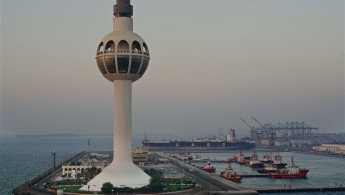Sudan warring sides make humanitarian pledge without truce
Warplanes roared overhead as explosions rocked Khartoum on Friday, just hours after Sudan's warring parties signed a commitment to respect humanitarian principles in their spiralling conflict, without a truce in sight.
Nearly one month after the outbreak of the fighting that has killed more than 750 people and displaced hundreds of thousands, the two sides signed the agreement late Thursday during talks in the Saudi city of Jeddah.
But already by the next morning the situation on the ground appeared unchanged, with the forces of two rival generals again exchanging fire in the Sudanese capital, which is home to five million people.
A witness in south Khartoum reported "fighter jets overhead and the sound of clashes and explosions", while another in the city's north reported "air strikes and the sound of anti-aircraft missiles".
Envoys in Jeddah representing the two generals - army chief Abdel Fattah al-Burhan and paramilitary commander Mohamed Hamdan Daglo - agreed to "affirm our commitment to ensure that civilians are protected at all times".
The agreement commits both sides to let in badly needed humanitarian assistance after looting and attacks targeting aid in the impoverished country, Africa's third largest in area.
The declaration calls for the restoration of electricity, water and other basic services, the withdrawal of security forces from hospitals and "respectful burial" of the dead.
The United States and Saudi Arabia, which together led the diplomatic drive, said talks were ongoing with a proposal on the table for a 10-day truce, which would lead, in turn, to negotiations on a longer-term end to fighting.
But as fighting and looting raged, US diplomats were frank about the obstacles in the nearly week-long talks in the Saudi port city.
"This is not a ceasefire. This is an affirmation of their obligations under international humanitarian law," said a US official involved in the negotiations, who called the two sides "quite far apart".
"We are hopeful, cautiously, that their willingness to sign this document will create some momentum that will force them to create the space" to bring in relief supplies, she said.
Almost 200,000 people have fled Sudan in addition to hundreds of thousands who have been displaced inside the northeast African country, the UN said Friday.
"As violence in Sudan continues for a fourth week, nearly 200,000 refugees and returnees have been forced to flee the country, with more crossing borders daily seeking safety," UN refugee agency spokeswoman Olga Sarrado told reporters in Geneva.
At least 18 humanitarian workers have been killed since the conflict flared on April 15, with many NGOs and United Nations agencies suspending their work at least temporarily.
The UN's World Food Programme said millions of dollars' worth of food was looted in Khartoum alone.
Only 16 percent of the capital's hospitals remain fully functional, with health facilities systematically looted, bombarded or suffering severe shortages of food and supplies.
The conflict broke out after a power struggle between Burhan and Daglo, most recently over the integration of the latter's paramilitary Rapid Support Forces into the army under a planned transition to civilian rule.
The RSF was set up and groomed by former autocratic president Omar al-Bashir for a scorched-earth campaign in the western region of Darfur.
The Forces of Freedom and Change, the pro-democracy force sidelined in a 2021 putsch by the two generals now at war, saluted the Jeddah declaration as "a first step in the right direction".
The UN-led support mission for Sudan, which also includes the African Union and regional IGAD bloc, also welcomed the declaration and called on the warring factions to "convey clear and unequivocal instructions to lower ranks" to allow humanitarian access and "translate these commitments to meaningful action on the ground".
In a statement Friday, Sudan's northern neighbour Egypt welcomed the declaration, which it said should "pave the way" for "a comprehensive and permanent ceasefire".
After previous truces evaporated, the United States said the two sides also agreed in Jeddah for the first time on ways to monitor any ceasefire.
A second US official said the negotiations were "very tough" and acknowledged both sides may have ulterior motives for ceasefire monitoring.
"Candidly, there is some hope on both sides that the other side would be seen as being the perpetrator of violations," he said.
"Frankly, we've seen violations by both sides in all the ceasefires to date and don't expect that to change."
But he added that the length of time spent in brokering the first step would at least make the ceasefire more "effective" if reached.
Diplomats and experts have questioned whether the two sides want peace or if they are more interested in vanquishing the other.




 Follow the Middle East's top stories in English at The New Arab on Google News
Follow the Middle East's top stories in English at The New Arab on Google News

![A group of Palestinians, foreign and Israeli activists gather to participated in an olive picking event on the land in the town of Battir, which is under threat of confiscation by Israel in Bethlehem, occupied West Bank on 8 November 2024. [Getty]](/sites/default/files/styles/image_330x185/public/2182930803.jpeg?h=199d8c1f&itok=__0LgGsa)
